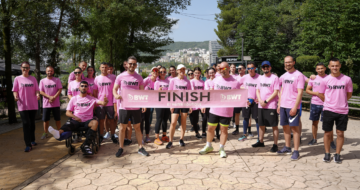Movement lab UHasselt investigates rehabilitation techniques in VR environment

The Faculty of Rehabilitation Sciences at UHasselt can now use the high-tech movement lab GRAIL. The lab consists of an advanced treadmill with a platform that measures step strength, among other things, a screen on which a virtual environment is projected, and numerous cameras that meticulously record and analyze the subject's balance and every movement.
The Faculty of Rehabilitation Sciences at UHasselt can now use the high-tech movement lab GRAIL. The lab consists of an advanced treadmill with a platform that measures step strength, among other things, a screen on which a virtual environment is projected, and numerous cameras that meticulously record and analyze the subject's balance and every movement.
The Faculty of Rehabilitation Sciences at UHasselt can now use the high-tech movement lab GRAIL. The lab consists of an advanced treadmill with a platform that measures step strength, among other things, a screen on which a virtual environment is projected, and numerous cameras that meticulously record and analyze the subject's balance and every movement. "With GRAIL, we can simulate lifelike situations, allowing us to research and develop new rehabilitation techniques for all kinds of patient populations," says Prof. Pieter Meyns, coordinator of the movement lab.
GRAIL - which stands for 'Gait Real-time Analysis Interactive Lab' - contains an advanced treadmill consisting of two separate step surfaces, allowing lin k and right foot to move at different rates. The treadmill can not only move uphill, downhill or sideways, but also simulate tripping, for example.
"Particularly interesting for our research, because in this way we can start to make sudden disturbances in our patients' walking trajectory and we can see what happens when the patient loses balance for a moment, for example," Meyns explains. "That way you find out a lot of interesting things that you can use to develop new rehabilitation pathways for specific patient groups."
After UZ Gent, UHasselt is the second institution in Flanders to have a GRAIL movement lab. "In addition to our own research projects, we will also work with UZ Gent on motion analysis and new rehabilitation applications within all kinds of patient populations," Meyns said. "We are thinking of children with developmental disabilities, individuals with MS or people with low back pain who would benefit from very specific rehabilitation exercises."
Furthermore, UHasselt wants to use the infrastructure for services through the RELAB platform and research collaborations with external partners, such as sports shoe manufacturers and orthopedic producers, or pharmaceutical companies. Collaborations with local hospitals for research and clinical applications for patients are also among the possibilities.
Latest insights & stories

A Global Movement: The World Unites in a Pink Pledge for Clean and Sustainable Water
5,000 participants. 32 countries. €30,000 funds raised. And that's just the beginning.
Picture this: One step that sends ripples across the globe, transforming lives and creating waves of change. You might wonder, how can such a simple action for most of us have such a profound impact?

Sustainability and circularity in construction
Join us in transforming the future of construction, creating buildings that not only stand the test of time but also contribute to a healthier planet!

RainTunes: Shower scenarios for the soul
Light, hearing, smell, and touch: Together with experts, we have developed sensuous scenarios that turn showering into an individual experience. Whether you want to prepare for the day ahead or relax after working out. Whether you want to refresh after a day’s work or unwind at the end of the evening: RainTunes surprises with multisensory experiences.*
*Currently available only in Germany and Austria.